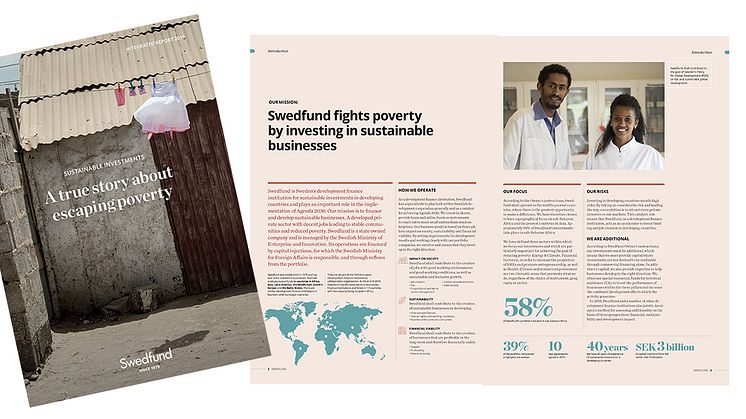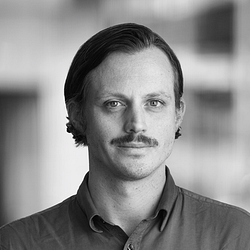
News -
Annual report 2019: Strong job growth in the fight against poverty
Swedfund’s portfolio helps to create almost 200,000 jobs. This is shown by Swedfund’s Integrated Report (IR) for 2019. The results from our investments cover all three parts where we follow up on the development of our investments, the so-called pillars: impact on society, sustainability and financial viability.
“We are proud of the results presented in our integrated report and there is every reason to tell more about it. But I must first and foremost say that our, as well as society’s, main focus is to deal with the Corona crisis. Swedfund works actively in assisting our portfolio companies in the developing countries,” says Maria Håkansson, CEO of Swedfund.
This pandemic strikes extra hard against the developing countries in which we operate. These countries have lower resilience in general and limited resources to deal with the consequences of the crisis. In connection with the financial crisis of 2008, we saw what enormous needs existed in these countries and how development finance institutions can support them by daring to continue investing, being perseverant and helping to limit the impact on the private sector and individuals.
“That’s why our role is so important. We work closely with the healthcare institutions we have in our portfolio, and we are looking at the financial consequences the pandemic has for the other companies,” says Håkansson. “Our assessment is that, like the 2008 crisis, the need for efforts by actors like Swedfund is central to dampening the impact the crisis has on SMEs, jobs and the reduced access to capital.”
The result of our IR shows that our portfolio companies contribute to the creation of almost 200,000 jobs, among other things. This is concrete evidence that our investments provide results and opportunities for more people to take the step out of poverty. In addition, the proportion of women in senior positions increased by 5 percentage points and the reported tax increased by 13 percent in 2018 compared to the previous year.
Summary of the portfolio companies’ results
Swedfund invests in loans, equity and funds to develop sustainable companies and institutions in developing countries. A developed private sector with decent jobs leads to stable societies and reduced poverty. We measure this by compiling the results of the portfolio companies, both in the form of reports from the companies and also by asking them questions and following up on the answers. As the portfolio companies report to us with a one-year delay, the results pertain to 2018. Below are the results within a number of indicators.
Impact on Society
Job creation
The goal is for Swedfund to contribute to the creation of jobs with a good working environment and good working conditions.
Results: Swedfund’s portfolio companies and funds’ underlying holdings contributed approximately 198,000 jobs in 2018, which is an increase of approximately 31,000 jobs, or 19 percent, compared with 2017. A total of 44 investments out of 69 reported an increase in the number of employees while 16 investments reported a decrease.
Taxes
The goal is for investments to be socially sustainable and taxes per investment must be followed over time.
Result: The reported tax increased by 13 percent in 2018 compared to the previous year. (From SEK 4,900 million to SEK 5,500 million). This is despite the fact that the number of investments that reported they paid corporate taxes decreased slightly compared with the previous year. The growth is mainly from sub-Saharan Africa, where we see an increase in reported taxes in several funds’ underlying holdings.
Empowering Women
The goal is that the proportion of men and women in senior management in the investments must have a positive trend / converge over a five-year period with a base year corresponding to the investment year.
Results: The proportion of women in senior management in Swedfund’s investments amounted to 30 percent in 2018, which is an increase of 5 percentage points from 2017 and further builds a positive trend over several years.
Carbon Footprint
The goal is for investments to be sustainable from an environmental and climate perspective, which entails responsible action and minimising the risk of negative impacts.
Results: Emissions from Swedfund’s portfolio companies in 2018 amounted to approximately 33,000 tonnes (2017: 24,000 tonnes). Emission of CO2 have increased relatively sharply in 2018, which is explained by a gas power plant that is now in full operation, resulting in a major impact on total emissions in Swedfund’s portfolio. The investment was made before Swedfund made a strategic decision to only invest in renewable energy in 2015, and therefore the CO2 exposure from Swedfund’s investment portfolio is expected to decrease over time.
Sustainability
Decent Work
Compliance with the ILO core conventions must be met in each investment no more than three years from the date of financing.
Results: Of the portfolio companies which during 2018 were in the category of investments held longer than three years, 73 percent of the holdings fulfil the requirements for compliance with the ILO core conventions. The proportion of companies in this category that comply with the ILO core conventions has been at a relatively constant level during the whole period 2016 – 2018.
Environmental and Social Management Systems (Sustainability Issues)
The implementation of management systems for sustainability issues must be met in each investment no later than three years from the date of financing.
Results: For the portfolio companies which during 2018 were in the category of investments held longer than three years, 82 percent reported and were assessed to meet the requirements. This is an improvement compared to both 2016 and 2017, when 53 percent and 68 percent respectively were assessed to have met the requirements.
Management System for Anti-corruption
The implementation of a management system for anti-corruption must be completed in the portfolio companies no later than three years from the date of financing the investment.
Results: Of the portfolio companies which during 2018 have been held for more than three years, 72 percent have submitted answers and are considered to have met Swedfund’s requirements. One portfolio company in this category does not meet the requirements in 2018. Even for the portfolio companies in this phase, Swedfund’s continuous work with anti-corruption has yielded results and the proportion that met the target increased from 32 percent in 2016 to 72 percent in 2018.
Financial viability
Profitability
The assignment’s goal describes that profitability will increase over a five-year period, with base years corresponding to the investment years.
The results show that the profitability of Swedfund’s direct investments have averaged between 4 and 11 percent during the period 2016 – 2018. For investments in funds, Swedfund monitors the underlying holdings’ financial viability by analysing the respective fund’s internal rate of return (gross IRR). During the latest three-year period the average gross IRR amounts to between 7 – 10 percent.
Return on Equity (Profitability)
The strategic goal is for the average return on equity to exceed the average interest rate on sovereign debt with a one-year term.
Results: Swedfund’s portfolio companies have had a positive return of 15 – 19 percent during the comparison period. Although the goal is to be measured over a seven-year period, the analysis after 2018 shows that the average return in Swedfund’s direct investment portfolio is at a stable positive level.
Swedfund’s result
Swedfund’s financial goals aim to ensure that investment activities are conducted in a financially viable way and that internal efficiency is high. This is expressed by a positive operating profit (EBIT) and that the C/I ratio should be a maximum of 0.9. The operating result (EBIT) for the financial year 2019 amounted to SEK 41.4 million. The C/I ratio for 2019, excluding exchange rate differences, was 0.84.
